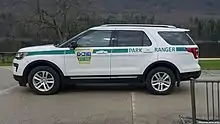Pennsylvania DCNR rangers
Pennsylvania DCNR Park Rangers are state law enforcement officers under the Department of Conservation and Natural Resources (DCNR). DCNR Park Rangers are present in both state parks and forests, which are considered different districts of state land under the DCNR within either the Pennsylvania Bureau of State Parks or Pennsylvania Bureau of Forestry. The only recognizable difference between the rangers is their badge (Park or Forest), while the authority remains the same. Citizen contact with DCNR rangers is typically infrequent—if at all—unless their services have been requested or the public is attending a special event or a local visitor center. The breadth of the term "ranger" may cause confusion, as there are other employees sometimes informally referred to as "rangers" in the state parks that are not law enforcement officers, who instead provide other services. The law enforcement officers can be clearly identified by the badge and other law enforcement related uniform, equipment and vehicle.

Responsibilities
DCNR ranger responsibilities have three primary elements:
- Public contact - Assisting visitors to make the outdoor experience safe, educational and enjoyable.
- First responder - DCNR "forest" rangers are trained and certified Department of Health medical first responders capable of providing basic life support in an emergency. Some DCNR rangers have continued their education and training to be certified as emergency medical technicians.
- Law enforcement - Rangers act as law enforcement officers the same way as typical police officers would, but also enforce game, fishing, and boating laws.
Authority
DCNR rangers have all of the following powers:
To be vested with the same powers as are, by existing laws, conferred upon constables and police officers of cities of the first class (a city with a population of 1 million or more, only one in PA and that would be Philadelphia). To make arrests without warrant for all violations of the law which they may witness, and to serve and execute warrants issued by the proper authorities: Provided however, that in cases of offenses for a violation of any of the provisions of the Vehicle Code, the power to make arrests without a warrant shall be limited to cases where the offense is designated a felony or a misdemeanor, or in cases causing or contributing to accident resulting in injury or death of any person. Act 18 of 1995, 71 PS Section 1340.302(c) & Section 303(a)(7)[1]
Notwithstanding any provision of the law to the contrary, individuals appointed and commissioned by the Department of Conservation and Natural Resources to preserve order in state parks or state forest lands are specifically authorized to enforce those provisions of this title which designate violations as summary offenses while acting within the state park or state forest lands. The authority includes the power to stop vehicles suspected of summary offenses, to issue citations for summary offenses, and if a vehicle is stopped for a suspected summary offense, to make arrests where evidence appears of additional offenses designated as misdemeanors or felonies. (Act 68 Section 6313(a). 2001)[2]